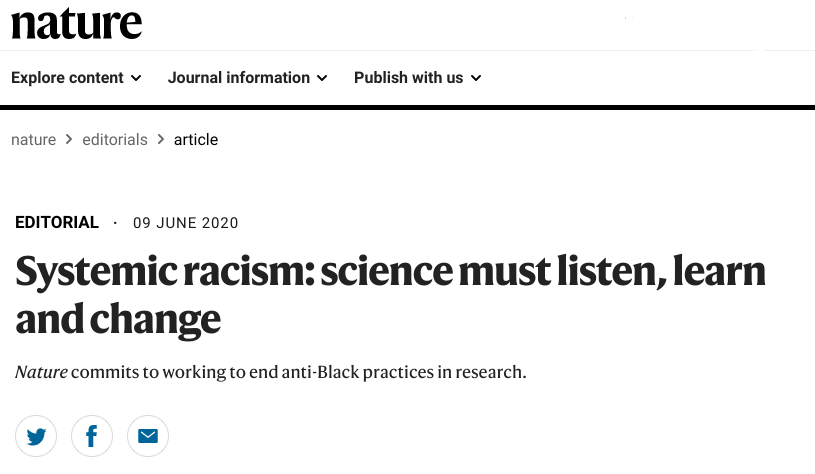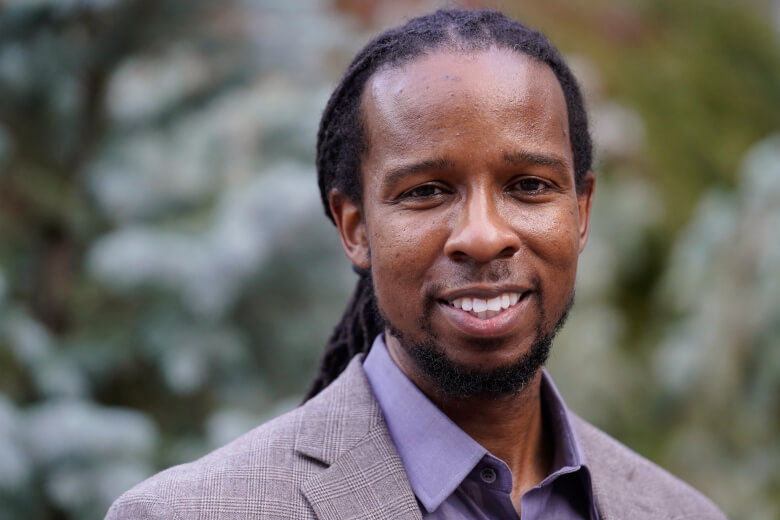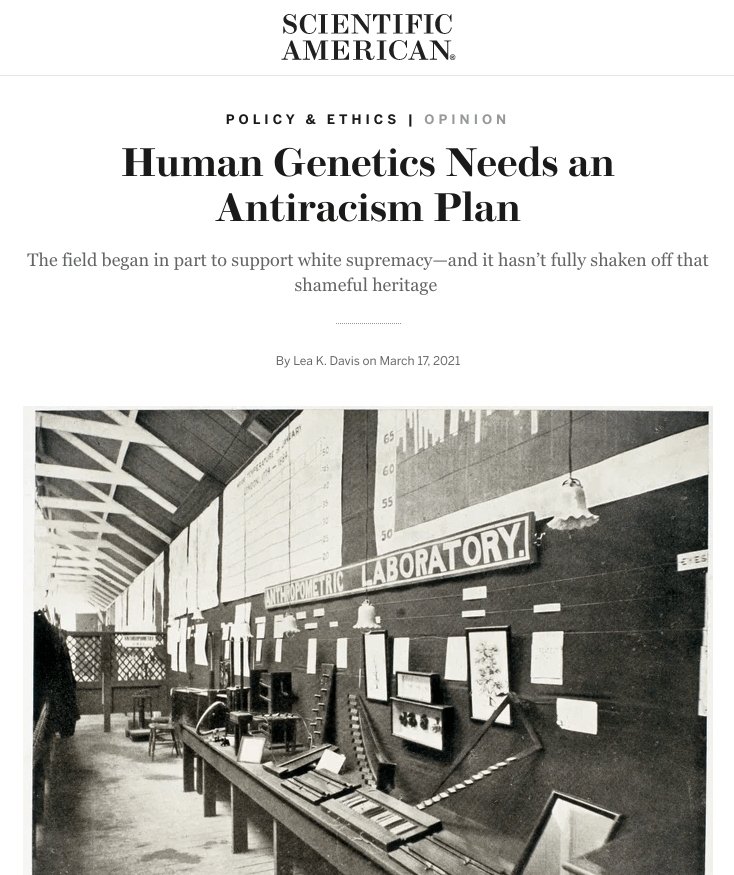The killing of George Floyd at the knee of a policeman last May ignited a global wave of protest. Almost twelve months of reaction and reflection have followed, culminating in Derick Chauvin’s conviction, extending to every aspect of American society, and rippling throughout the world.
Even science and the specific field of genetics, often put forth as a model of dispassion and objectivity — only the evidence, please — has found itself thrust into the center of a debate that oscillates between thoughtful and censorious, cleansing and politically correct.
The study of human genetics emerged from a deep curiosity of our human inheritance that was firmly rooted in white supremacy.
So began an opinion piece that ran last month in Scientific American. In the article, Lea K. Davis, a research professor of medicine at Vanderbilt University Medical Center, maintained that while “the harmful racist history” of American medicine and science is fading, “the culture of whiteness continues to dominate.” She ends with a demand:
Human genetics needs an antiracism plan now, otherwise, we must admit we plan to be racist.
This article on ‘systemic racism’ is the most recent in what one academic journal called a surfeit of “editorials, features and commentaries on the impact of racism” in genetics and medicine that have appeared in leading science publications. These include no less than Science, Nature, and New Scientist, and such organizations as the International Science Council, National Academies of Science and the American Association for the Advancement of Science. Even the Harvard Business Review weighed in on the issue.
Establishing a deep knowledge of science’s racist history — and how it informs present-day scientific practices — is the first step to making effective and sustainable changes.
Putting ‘science racism’ in perspective
A common theme runs through almost every article and appeal. They mostly draw on what’s become known as “critical race theory” (CRT), an intellectual movement now ascendant in academia that challenges us to re-examine all aspects of our culture and legal system through the prism of race. It’s unifying theme, proponents claim, is that ‘white entitlement’ is endemic, suffusing all of culture and corrupting all relationships and institutions, science among them.
As Nature wrote in a self-castigating editorial last June, “The enterprise of science has been — and remains — complicit in systemic racism.” Most of the articles lay an array of familiar prescriptions on ending “longstanding racial biases”: teach the history of eugenics; examine and dismantle ‘systemic racism’ in science institutions; embrace the belief that risk factors are not explained by biological differences between “races”; recruit more minorities to STEM. 
There also have been numerous appeals to embrace “race-conscious medicine” and “an antiracist posture”, particularly in the study and application of human genetics research and medicine. These issues are clearly important and much in need of critical discussion and dissection; this is not a trivial pursuit. But what we conclude is far from universally agreed upon. That’s the shark-infested ideological waters we are about to swim in.
Antiracism as the means to ‘root out racism’?
Demands within and outside science to root out ‘systemic racism’ in every nook and cranny of society, including and especially science, is both welcomed and problematic. They create a dilemma for those, like me, who are sickened (but not personally victimized) by racism. Most especially, I’m troubled by the universal application of these recently-emerged race critical theories — not their intent (to tackle racism and its egregious outcomes), but rather the methods advocated as the best means to bring this transformation about.
This quandary is exacerbated by how ‘antiracism’ is defined. Critical race theorist Ibram X Kendi, a historian at Boston University, argues that there is no such thing as being a ‘non-racist’. In Kendi’s influential opinion, you are either actively antiracist or you are a racist. To him, to question antiracist theory, is to risk being labelled a racist.

That seems problematic. If we truly want to address the scourge of racism, it seems a given that we must do so in an open, honest and unflinching manner — and this includes critically examining the race critical/antiracist position. The musings that follow are not an exhaustive critique; the intention is to highlight the strengths and shortcomings of the race critical perspective on genetic science, and hopefully suggest a more productive path forward.
Decolonizing genetic science
The call to ‘decolonize’ established public institutions “to challenge and change White superiority, nationalistic history and ‘truth’” extends broadly to genetics, to wider science and even to scientific knowledge itself. In parallel with this movement, advocates of social and racial justice have prompted much soul-searching about the attitudes and beliefs of prominent historical scientists.
Consider the Victorian era polymath Francis Galton, who promoted eugenics (he even coined the phrase) and other ‘Social Darwinist’ theories that attempted to apply Darwinian notions of natural selection, selective breeding and survival of the fittest to human society, economics and politics. Long regarded as an enlightened and progressive thinker, history has not been kind to Halton. He is now seen by many as the intellectual progenitor of extreme nationalism, fascism, Nazism and even American racism.
In that light, what should we make of increasing demands today to redress the injustices embedded in the cultural amber of the past? There is an urge to recast the past using the mores of the present: even the legacy of Abraham Lincoln has come under harsh criticism due to his complicated and occasionally contradictory history in support of Black independence and dignity.
Inevitably, the deeply felt wounds of racism clash with history, or at least our traditional narratives of history. Which side are we on, we are often asked. Are criticisms of decolonization — as ideological pseudoscience, say, or another iteration of today’s wider ‘Culture Wars’ — themselves merely a reactionary backlash? Are we spurring a much-needed re-examination of science’s dark and often unreflective past? Or are we simply falling prey to ‘woke ideology’, the political correctness of the social media age?
Critical theories of race
Lea Davis’ Scientific American (SciAm) article ‘Human Genetics Needs an Antiracism Plan’ provides a useful starting point to critically address these questions.
There is little to quibble about the claim that widely-held ‘folk’ conceptions of race are badly wrong. As SciAm points out, “the false and dangerous beliefs of biological race and human racial hierarchies” over-simplify genetic reality. Simplistic biological divisions based on skin color do not capture the huge genetic diversity within such broadly-defined human groups.
So far, so good. Yet, as Davis also makes clear, ancestry is still important, especially in determining the “the underlying biology of complex disease” and genetic differences that arise “as a consequence of different demographic histories”. If we fail to take genetic ancestry into account, we may fail to understand differences in disease prevalence in different populations.
Geneticist David Reich made that very point in a controversial New York Times essay in 2017. But he warned that rejecting outdated beliefs only to replace them with another form of dogma could make things worse.
It is true that race is a social construct. … But over the years this consensus has morphed, seemingly without questioning, into an orthodoxy. The orthodoxy maintains that the average genetic differences among people grouped according to today’s racial terms are so trivial when it comes to any meaningful biological traits that those differences can be ignored.
Indeed, according to Reich, the new orthodoxy went further, holding that we should be suspicious about any research into genetic differences among populations. And while he had “deep sympathy for the concern that genetic discoveries could be misused to justify racism,” as a geneticist he believed it was no longer possible to ignore average genetic differences among racial populations that dramatically impact such fields as medicine.
Recent genetic studies have demonstrated differences across populations not just in the genetic determinants of simple traits such as skin color, but also in more complex traits like bodily dimensions and susceptibility to diseases. …
I am worried that well-meaning people who deny the possibility of substantial biological differences among human populations are digging themselves into an indefensible position, one that will not survive the onslaught of science.
If Black is not a meaningful category, why is “white”?
As Reich suggests, there is more than irony at work here. At the same time that critical race theorists and their supporters caution against “the myth of biological race,” the broad yet ill-defined racial term ‘white’ is used repeatedly — as in the SciAm article, for example: “white supremacy”, “white centering”, “white academics”, “white researchers”, “white people”.
This even extends, so the article suggests, to a “white perspective” (and a contrasting “non-white perspective”) on science and the world. Such an idea, though, is itself problematic: it implies that all white people share a single point of view, while all non-white people share another. That whiffs of race essentialism — the historically pernicious idea that each different ‘race’ has unique traits and characteristics distinguishing them from others.
A similar denial of race and yet fixation with race identity is central to modern CRT, which can be broadly defined as the belief “that race itself, instead of being biologically grounded and natural, is a socially constructed concept that is used by white people to further their economic and political interests at the expense of people of color”.
CRT attracts both strong support (e.g., as “an insightful and nuanced approach”) and trenchant opposition (e.g., as “a fashionable ideology”). Nevertheless, at least as presented in discussion of human genetics, the CRT perspective results in a contradictory position: a justifiable rejection of a simplistic application of the concept of biological race alongside the confusing adoption of racial identity based on skin color (“white”, “people of color”) that similarly lacks diversity and differentiation.
Different shades of “white”
The CRT tendency to lump everyone of European ancestry as “white” obscures an obvious fact. Europe’s disparate people have historically regarded themselves as culturally and biologically distinct. To the Ancient Greeks, for example, and later the Romans, other peoples were barbarians: “foreign, strange; ignorant” barbarians — those who vocalized with the ‘bar bar’ of animals.
In Britain, the Anglo Saxons regarded the older Celtic peoples, such as the Welsh, as racially different (again reflected in language: in Old English, Welsh meant ‘foreigner’; the Welsh, by contrast, refer to themselves as ‘Cymru’ or ‘fellow countrymen’). Indeed, the brutal suppression of existing cultures has always been a feature of British history, from William the Conqueror’s ‘Harrowing of the North’, to the Scottish Highland clearances to the quashing of indigenous languages, such as Cornish and Manx. And this was a pattern repeated across Europe.
Well into the 20th century, the Celtic Irish were regarded as a separate and inferior “race”—thus the savagery of the English general Oliver Cromwell in Ireland in the 17th century, say, or the indifference to the death and suffering during the Irish Potato Famine (or ‘Great Hunger’) all had a racial element. Most notably, Charles Darwin, the founding figure of modern biology, readily described the “careless, squalid, unaspiring” Irish as a distinct “race” in his influential Descent of Man. (Ironically, in Northern Ireland, Irish Catholics and Irish Protestants have historically seen themselves almost as different ‘races’, with the Catholics viewing Protestants as foreign invaders sent by the Anglican Church to colonize them in the early 17th century.)

Less than a hundred years ago, the Irish were a despised and oppressed ‘race’, as the term was liberally used then. So were many other cultural minorities in Europe. Yet how would Irish people be regarded from a CRT perspective today? Seemingly as “whites” and thus the unfair beneficiaries of “white supremacy”. And what of other oppressed European minorities? Or European Jews and Roma, the major victims of the apogee of racist, eugenicist thinking, the Nazi Holocaust? Presumably, they too are “white”.
It’s fair to ask: does such a blanket term help us assess and redress historical oppression and discrimination?
Systemic racism
While this criticism is perhaps unfair to more nuanced versions of CRT (though not of how it is often popularly presented, such as in the SciAm article), it underscores the inadequacy of an all-encompassing racial term like “white”. This is even more so of the term “black.” Disparate African and African-descended peoples, scattered among many continents, are among the most diverse in the world. In respect to diversity, the term “people of color” is so broad as to be meaningless; when simply used to mean “non-white,” however, it appears almost derogatory, implying that humanity is divided between “whites” and “others” — which has emerged as a tenet in many CRT circles.
There are other shortcomings with the racial identity approach to genetics espoused in the SciAm opinion piece. Take the following claim:
Lack of diversity in available genetic data is not an accident; it is an inevitable consequence of systemic racism in biomedical research. The difficulty in recruiting non-European populations into genetic research today is a direct result of our history of white centering, gatekeeping by white academics and decades of human rights abuses suffered at the hands of white researchers.
As previously mentioned, the odious legacy of much of genetics must be acknowledged; this history has indeed made many minority groups suspicious of genetic research into their communities. It is also true that available genetic data are overwhelmingly based on European/European-descent samples. One recent longitudinal review of genome-wide association studies (or GWAS), for example, indicated that almost 90% of participants were of European ancestry, with tiny Iceland, along with the UK and USA, making up nearly three quarters of these samples. The point of contention, however, is whether racism is the sole or, nowadays, the major remaining cause of such unrepresentative studies.
Other explanations appear as likely. For the numerous GWAS studies of ancient remains, for instance, Europe offers well-preserved archaeological sites, long-established museums and collections, and the infrastructure to bring such disparate resources together. Practical considerations (such as time or funding) also constrain what is possible over what is desirable. Thus gathering European genetic samples may be the easy ‘line of least resistance’ — not the ideal solution but not consciously racist.
The same is also true of studies of human behavior that overwhelmingly rely on so-called WEIRD (western educated industrialized rich democratic) participants. They depend on college students, a readily available and inexpensive to recruit pool.
As for the over-representation of Icelanders (and Jews, Basques, Costa Ricans or the Amish) in Genome Wide Association Studies, the key factor is descent from a historically insular community. That Iceland is “a paradise for geneticists” is due to its 1000 years of relative isolation (and thus distinct genetic change) and extensive genealogical records, not to racist or white supremacist bias.
Whether we are talking of research into human genetics or human behavior, many current practices produce skewed and unrepresentative results that do not capture the range of human diversity. This is a situation that clearly needs to be addressed. Yet it is a stretch to claim that it is mainly the consequence of deliberate discrimination against “non-white” populations.
Towards a more diverse view of science
Like many similar commentaries, Davis’ SciAm piece accepts identity politics concepts and claims about “race” as a given. For example, she argues:
[M]ost human geneticists know very little about race. Scholars in sociology, anthropology, critical race theory, gender studies, etc. who have a far more sophisticated understanding of the origins of race and racism, have so much to teach us. Through their scholarship we stand to gain deeper insight into our own science.
Yet the educational road goes in both directions. Many social scientists’ harbor misconceptions about human evolution and genetics; they stand to gain from a deeper understanding of human evolutionary biology that geneticists can provide. As a recent commentary in the magazine Aeon puts it: “ignoring genetics dooms much work in the social sciences to failure, wasting massive amounts of time and money and opportunities to improve people’s lives”. (The latter article, it should be noted, also provides a nuanced response to the question: “The pioneers of social genetics were racists and eugenicists: should we give up on the science they founded altogether?”)
Broadening the multidisciplinary scope of human genetics and human evolutionary biology can only be for the good; narrowing it to the single lens of race identity seems to be the opposite. And if we are to bring cleansing light to this delicate and contentious issue, a multitude of other forms of stereotyping should also be addressed — against women, or the LGBTQ community or castes.
Prejudice is indeed embedded in our history and our science. For example, in the Descent of Man, Darwin’s biased beliefs about “savage races” are matched by his chauvinistic opinions of “the reckless, degraded, and often vicious” working class, the “feeble-minded”, and, of course, the “weaker sex”.
Of course genetics needs to raise and to examine the misdeeds of its past. And of course it must work against still-existing structural inequalities. But this will not occur through unreflective adoption of ideologically-inspired social theories. Reducing human beings and the challenges we face to one dimension, “race”, is what the racists of the past did. We need a science of genetic that focuses on helping human beings in all their diversity.
Patrick Whittle has a PhD in philosophy and is a freelance writer with a particular interest in the social and political implications of modern biological science. Follow him on his website patrickmichaelwhittle.com or on Twitter @WhittlePM
This article previously appeared on the GLP on April 27, 2021.
































